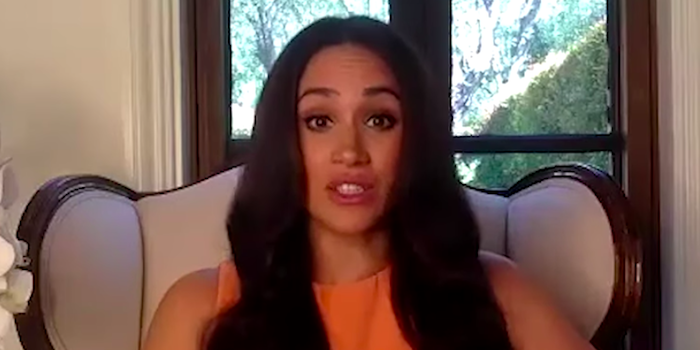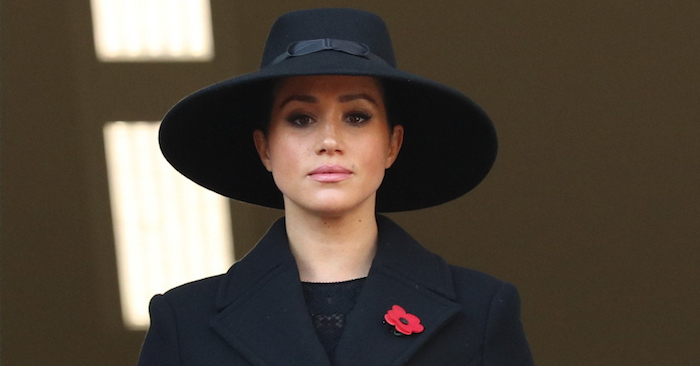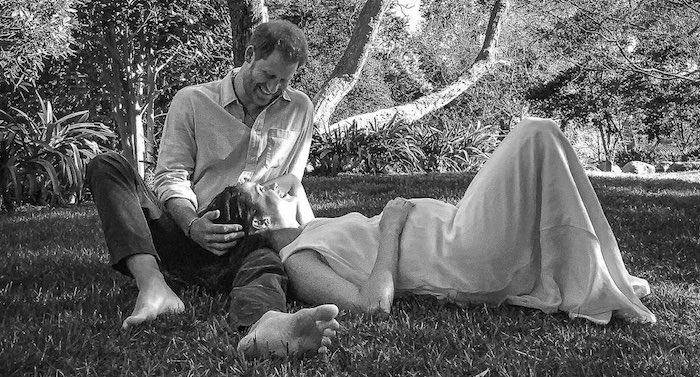The Duchess of Sussex took part in The 19th Represents, which is a virtual summit for the newly launched nonprofit newsroom The 19th. Meghan interviewed the Co-Founder and CEO of The 19th, Emily Ramshaw, about what propelled her to create the organization.

The 19th is a nonprofit, nonpartisan newsroom reporting on gender, politics, and policy. They have an emphasis on facts, data, and evidence-based reporting and being transparent about their funding. You can read more here.
The majority of the interview was Meghan as interviewer with a little bit of commentary on what Ramshaw was saying, but there were a few times when Ramshaw asked Meghan questions. I’m quoting Meghan’s longer answers and comments. You can watch the full video here, and I’ve embedded it below as well.
Why do we need a woman-focused news organization and how will things be different with women at the helm?
Well, you know, it’s so interesting is, and I was actually reading just a couple weeks ago this fascinating article about the suffrage movement, and what resonated with me about it is specifically the term ‘suffragette’ – and you’ll follow my train of thinking in a moment – because the impetus for the word suffragette started in a UK newspaper in 1906 and it was meant to belittle the women who were part of the suffrage movement – oh we’ll just add a little ‘ette’ to the end here. And what I find so fascinating is that was then, before digital media, before the online space, before things could travel around the world with rapid fire, and the American women as part of the suffrage movement didn’t want to be called suffragettes, and yet this term, coined by one man in 1906, has stuck as part of a movement. And I think when you look at that, and look at it through that lens of the power of one person’s influence in the media to be able to shape an entire movement or way of thinking or even an ideology or an identification, if women have their voice heard as equally, how different that would have been, right, and so even though in that article the point was not about the term suffragette what stuck with me was the ability of influence and if it’s only coming from a patriarchal lens, how that’s shaping everything that we see. And whether you actually read the article or not, this one or any other one, I think what’s so fascinating, at least from my standpoint and my personal experience the past couple of years, is the headline alone, the clickbait alone, makes an imprint. That is part of how we start to view the world, how we interact with other people, and I think there is so much toxicity out there, um, in what is being referred to – my husband and I talk about it often – this economy for attention, right, that is what is monetizable right now when you’re looking at the digital space and media. And so if you’re just trying to grab someone’s attention and keep it you’re going for something salacious versus something truthful, and I think that once we can get back to the place, which is what you’re creating here which is why I think it’s so important, where people are just telling the truth in their reporting, and telling it through a compassionate or empathetic lens, is going to help bind people as community in a way that, I think, in the moment we’re feeling much more of a disconnect in a space where we could be feeling more of a connection.
My own transcription of the YouTube video below
Clickbait is a thing because most people don’t want to pay for online content. Film Theory has a video on yellow journalism and clickbait in media – it’s from Dec. 2016 and focuses on YouTube, but it’s interesting and still relevant.
On The 19th having reporters all across the US
I think what’s so fascinating, too, to that point obviously you know, this year’s election and the voting is so incredibly important – it’s something I’m very passionate about. I was talking yesterday with Gloria Steinem, who I’ve connected with recently, and legend, right, so you just go how fantastic to be able to have that time, but talking about the importance of the vote, and even right now the census isn’t going to be able to be completed this year because of COVID, and you think about women who are in marginalized communities or areas where they aren’t going to be able to be accounted for, how special, as you say, that with The 19th you don’t simply have reporters in these large cities but you have a representation all throughout the country and in pockets where you might not normally hear those voices but they are so valuable to be heard because it helps us understand what each of us are going through as opposed to this broad stroke. I think it’s key, I think, you know that alone is really going to shape the kind of storytelling you’re going to be able to do there.
My own transcription of the YouTube video below
On The 19th changing the game for journalism, and on voting
I can’t imagine that you wouldn’t be, right, and people are craving a change. I think in the place that we’re all in right now there’s such a moment where people are starting to question the systems that we’ve always believed in, where we’re getting our information from as well, and I think, you know, you want to have trust in journalism and you want to have trust in what you’re reading and hope that it’s fact, I mean I think we’ve become so, sadly, comfortable with the idea that we’re just getting all this stuff and it becomes noise as opposed to true and accurate journalism. So I think, you know, if this can be the catalyst for reset for other news organizations, my goodness it’s going to change the game so much, and specifically that it’s bi-partisan, you know, I think when I have these conversations about encouraging people to go out and vote, I think it’s often challenging for men and women alike, but certainly for people to remember just how hard it was to get the right to vote, and to be really aware of not taking that for granted. I mean, I look at that, my husband for example, he’s never been able to vote. And I think it’s such an interesting thing to say the right to vote is not a privilege, it is a right in and of itself. But I really do hope that what you’re able to encourage, and what we’re able to see happen through The 19th over the course of the next few months, is that women understand that their voices are needed now more than ever and the best way to exercise that is through voting.
My own transcription of the YouTube video below
The British royals aren’t technically barred from voting. The Queen chooses not to vote, but there isn’t a law prohibiting the other royals from voting. My guess would be that the other royals are strongly advised not to in case that information is found out somehow and causes a ruckus for the monarchy. So if Harry has never voted that technically is his choice, although he may have been pressured not to.
On coming back to the US during Black Lives Matter protests
You know, I touched on this a couple months ago actually, right when I had come back and I said a few words for my high school alma mater for their graduating class because I had come back after being away for so long, and – because really I haven’t lived in the States for almost 10 years, I lived in Canada for seven years for work, so it’s a really long lapse in time from being here – and to come back and to just see the state of affairs, I think at the onset, if I’m being honest, it was just devastating. It was so sad to see where our country was in that moment. And if there’s any silver lining in that, I would say that in the weeks that were happening after the murder of George Floyd, in the peaceful protests you were seeing, in the voices that were coming out, in the way that people were actually owning their role, and acknowledging their role, that they played either actively or passively in discrimination of other people, specifically of the Black community, it shifted from sadness to a feeling of absolute inspiration, because I can see that the tide is turning. And I think for so many of us it’s very easy to focus on the negativity, it’s very easy to focus on that because it’s what you hear out there, right, uh, I think I said to the high school girls when I was speaking to them, the loudest voices are often the negative ones, sadly, so I think, you know, from my standpoint, it’s not new to see this undercurrent of racism and certainly unconscious bias, but I think to see the changes that are being made right now is really, it’s, um, it’s something that I look forward to being a part of. Um, and being a part of using my voice in a way that I haven’t been able to of late. So, yeah, it’s good to be home.
How many times is Meghan going to bring up the fact that she recorded a video for her high school’s 2020 graduating class? She brought it up during her Girl Up video, too.
As far as the comment on negativity being the loudest voice: yes. In the Film Theory video I linked above they talk about how anger is the emotion that has the highest chance of getting someone to share a video or article, and I’ve noticed in the past on my Kate Middleton Review blog that the articles with the most comments were the ones in which anger was a driving factor. Unfortunately, veering toward negativity is human nature; we often focus on the negative over the positive.
I really like Emily Ramshaw – I think she’s an excellent speaker and I enjoyed listening to her. I like what she was saying about why she started The 19th – after seeing the conversations around women in politics in 2016 and during the primary season for this year’s election cycle – and why there is an asterisk in their logo – because the 19th amendment has yet to be fully realized. I also like what she said about finding women on the platforms they’re already on, and not just asking them to find The 19th on their own platform.

Something I’ve noticed for a while now, but that this interview really drove home, is how often Meghan uses “right” as a filler word. I’ve called out Kate (and William and Harry) for years for her over-reliance on filler words, but Meghan also relies on filler words and phrases; it’s just that Meghan’s filler words are different – instead of “um” and “kind of”, it’s “right” and “I think”.
I have to say, Meghan’s comments are a bit all over the place when actually paying attention to what she’s saying, and especially reading it back. I understand that’s how people talk, and if Meghan’s comments were off-the-cuff and not planned then it makes sense. But I commented on something very similar about Kate’s comments during her Tiny Happy People interview a month ago, so I thought I’d mention it.
Two positives to counter-balance the negatives: I think Meghan did do a good job in interviewing Ramshaw. Ramshaw did turn the tables and asked Meghan questions, and Meghan also provided commentary in between questions, but I like that. I think it made for more of a conversation type interview which was easy to get through.
Second thing, and this is clearly the most important: obviously Meghan read my note about how the plain beige background was awful so she switched it up and got herself an actual room to exist in. I kid, but seriously, yay that there’s finally an actual setup for these Sussex video calls!





